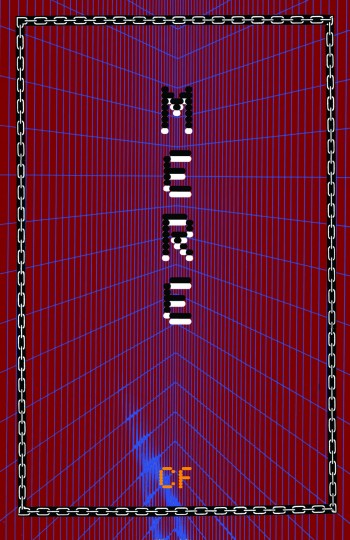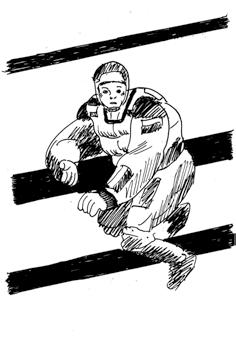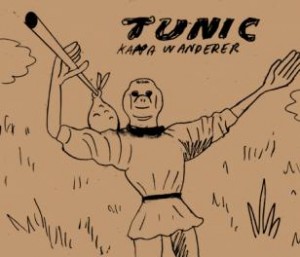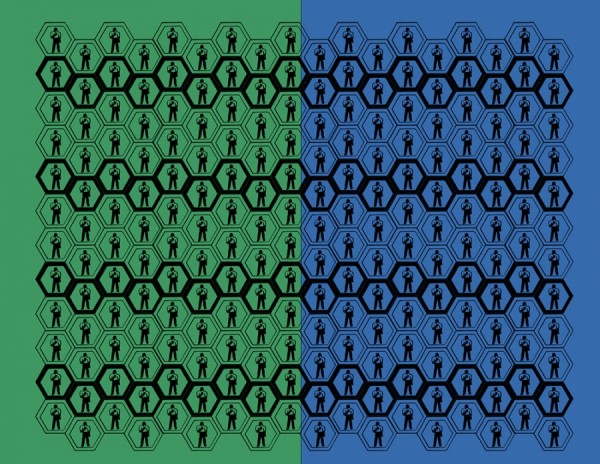 Home > CR Interviews
Home > CR Interviews CR Sunday Interview: Christopher Forgues (C.F.)
posted June 9, 2013
CR Sunday Interview: Christopher Forgues (C.F.)
posted June 9, 2013


*****
Christopher Forgues, better known to comics fans as CF, is one of the more intriguing talents working in comics. A musician and a widely-exhibited visual artist in addition to a comics-maker, CF's latest on the funnybook front is
Mere, a sideways trip away from the popular
Powr Mastrs books into a series of comics experiments that fold in elements of performance in addition to the cartoonist's usual wide-range of influences. Reading
Mere is like watching a formidable cartoonist reboot himself. Forgues has a devoted fanbase, several of whom came out to see him during the recent
Toronto Comic Arts Festival. This interview took place early Saturday evening at that show, in the hotel room he shared with
PictureBox publisher Dan Nadel. CF is incredibly soft-spoken, and I liked very much talking to him. He is not a cartoonist whose work comes easily to me, and I think I like that best of all. -- Tom Spurgeon
*****
 TOM SPURGEON: I don't have a natural "in" to your work. Sometimes when I read something you've done, a way to analyze what I've just read fails me. I tend to like what you've done, but it may be that I don't always understand everything you bring to your work. So I hope you'll accept some really basic questions from me about
TOM SPURGEON: I don't have a natural "in" to your work. Sometimes when I read something you've done, a way to analyze what I've just read fails me. I tend to like what you've done, but it may be that I don't always understand everything you bring to your work. So I hope you'll accept some really basic questions from me about Mere
.
CHRISTOPHER FORGUES (CF): Sure.
SPURGEON: I know that this book collects a series of different projects; I believe they were either mostly or entirely mini-comics that you put out there via Twitter, and that these mini-comics were snapped up immediately. Now in doing this range of work, was there an end result in mind? Was there an overall conception of what you wanted to do with the series of works?
CF: I wanted to make a series of very short, kind of vaguely genre-defined series that were crippled or destabilized.
SPURGEON: So you conceived of this as a suite of different things. You broke it down.
CF: Yeah.
SPURGEON: You were analytical about how you wanted this project to present itself, how you wanted to craft the overall statement.
CF: Definitely. Yeah, that was the plan. Each 'zine was only twelve pages. There's a core that's all of that work, and there is extra work.
SPURGEON: Which would be example of an extra one?
CF: "Twitter Comics" and the
New York Times thing. Some of the weird color photos.
SPURGEON: What was it about genre comics that made you want to use that as part of your starting point? Do you have a long relationship to genre comics, or did that merely facilitate the larger point?
CF: I think I was just trying to think of comics... [laughs] and my memory of them, my relationship to them. What the touchstones were for me when I was a kid. The really basic ideas... just trying to find what I could boil down the aspects to where you don't necessarily know [laughs] what's going on. Even with the design and things, I wanted to get the same feeling from a hologram cover or commercial comic, that feeling you would get. The way when you're a kid when you're looking at a comic or a movie and you get these impressions... that can be very rich. Almost better than the plot. It was something I really wanted to try.
SPURGEON: How old a man are you?
CF: I'm 33.
SPURGEON: The comics you encountered... were you just randomly encountering comics when you were a kid, or were you one of those consumers with a plan, that comics was these things you did on this day and to this extent.
CF: It's hard to explain. I liked the idea of having a subscription, the idea of it, you know? So I would get... I had a subscription to
X-Men, because I thought, "That has the most characters." I would just get them... sometimes I didn't even read them, I just liked getting them. [Spurgeon laughs] That was some of the first comics experiences I had. After that, it was just searching for things that I thought were... I don't know. Different. [laughs]
 SPURGEON: Where were you?
SPURGEON: Where were you?
CF: I was in Massachusetts, rural Massachusetts.
SPURGEON: So when you wanted to reach out, were you able to find these comics?
CF: I was looking at the boxes under the bins, trying to find... I found Chester Brown, things like that.
SPURGEON: Chester was a big cartoonist for a lot of people, in part because his work was very direct.
CF: It's almost austere. The clarity... the kind of absolute... talking about what he was talking about but still having the cartoony elements. Everything about it felt so complete. It felt more to me like, "This is art," really. I don't even mean fine art necessarily but the art of comics, really. This guy is an unbelievable cartoonist, and these are like
new cartoons. This is a person that understand comics and how to use them. I was like, "Oh. I can use comics to do anything."
SPURGEON: When I asked a few other people about your work, about your process, one of the things they all came back to was how you are still largely processing these primary influences: Gary Panter, Fort Thunder, maybe Chester would be included there. Are these artists that work in ways that give you permission to make the kind of work you want to make for yourself?
CF: Yeah, but also the other wing on the plane is Roy Crane, and
Nancy; hardcore professional comics... all that kind of stuff.
SPURGEON: It seems like your interest in Roy Crane may come out in how you seem interested in movement. Although I also detect some similarities in how you occasionally round your figures and how you carve space within panels. How did you find Crane?
CF: That was from working in a comic shop.
SPURGEON: What is it about Crane that you're still interested in him, then? A lot of people dismiss Crane as simplistic, both in terms of the refinement of the drawings and the themes engaged in his narratives.
CF: Yeah, his forms, his proportions, and the way he uses blacks and black and white as color, it's very dynamic and simple. It's so many things that comics does well. Like [Yoshihiro] Tatsumi... there's an inter-dimensional queerness where there's a photorealistic plane where the proportions are very realistic and then you have these characters that are not. That weird in-between state, I'm really interested in that.
 SPURGEON: What is the nature of your reaction to that? That's not an uncommon thing in comics... do you know the effect that specific element within certain comics has on you?
SPURGEON: What is the nature of your reaction to that? That's not an uncommon thing in comics... do you know the effect that specific element within certain comics has on you?
CF: It's a problem in comics that you always know that you're looking at a drawing. There's a struggle in how you represent the real in comics.
SPURGEON: There's something fundamental to the best comics of the 1930s and 1940s, with cartoonists like Crane and Harold Gray, where it's not just the intellectual idea of these shapes on the page and how you look at them, but that they're actually emotionally affecting in some way. That doesn't seem far off from what you're doing in Mere
. Is that important to you at all, that you get to these base, cathartic reactions to comics art?
CF: Yeah... it's a language that's hard to define, but it's very real. All of the different languages sort of defy description, but they communicate in a way that may be partly subliminal.
SPURGEON: So would one way of looking at Mere
be that you're limiting yourself, even tricking yourself, in a way that helps you get to those core elements of comics language?
CF: I feel like it was just really something I had to get off of my chest. I didn't quite understand what... I don't know... anger or something? [laughs] I don't know what it is. I felt it was something necessary for me to do. Something to do with facing comics, coming to term with comics, in the larger history of that. Everything that that means. Not just, 'Oh, you make these weird comics" and they place you in a certain cultural milieu. I think if you're an artist or a writer or whatever, you can look back on this entire history of criticism and work... cartoonists don't necessarily do this.
SPURGEON: What is the essence of their not trying to do this? What is the essence of the self-hatred there?
CF: It's pretty rough... just the whole... I don't know, man. It's very strange. These simple drawings... cartooning is very abstract. You're abstracting a person... I don't know, it's like a calling or something. This project was very selfish.
 SPURGEON: So where did you end up on the other side?
SPURGEON: So where did you end up on the other side?
CF: I think... you have to have so much commitment to make comics, you know? And sometimes I don't know why.
SPURGEON: Now, there's a performance aspect to Mere
as well. There's a watching of you make the work.
CF: Yeah.
SPURGEON: That's interesting to me given that you're also a musician and perform that way. Is making a performance of something just the way it's easiest for you to make a work like this? Or was there an overt point being made here about performance? One thing that always intrigues me about people that value the process and love the doing of something is the fact that this work exists as an outcome rather than a process. Why even publish?
CF: Well, it holds you responsible, first of all. It's quite easy to draw ridiculous things all day and put them in a drawer. [laughs] It's easy to do a shameful thing all day. It's much harder to do a thing that' a big risk, even privately, and take it public. People weren't psyched about these 'zines. [laughter]
SPURGEON: What were you hearing back?
CF: A lot of people were like, "These are not good." Some said it doesn't make any sense.
SPURGEON: Do you think people have an expectation in terms of what kind of work they expect from you?
CF: I think that was part of it, too. "Powr Mastrs, Powr Mastrs, Powr Mastrs..." I have to become a better artist. This is hard to talk about. I don't know. I wanted to expand my knowledge of comics by going to the comics that were the hardest to draw.
 SPURGEON: Why "shameful"? You used that word a few minutes ago. That's an interesting word.
SPURGEON: Why "shameful"? You used that word a few minutes ago. That's an interesting word.
CF: Not the comics themselves, but their tradition. I don't like a lot of comics, but I don't want to say that. That's how I feel.
SPURGEON: So is the project in part a reaction to Powr Mastrs...? Is part of your process about any given work figuring out how you feel about that work?
CF: Yeah, but it's also about making an object.
SPURGEON: There is something interesting about the way we process comics when we see them without context... do you think you got to the point where you made comics that maybe can't be immediately contextualized the way everything is right now? I mean, it seems to have that kind of mystery to it where you can't place the work immediately into a broader set of ideas.
CF: I was trying to escape everything. The idea of what my comics are, the idea of what comics are. I wanted an object that whether or not the people reading it know who I am or not, it's rife with questions. I have my own ideas of what I'm drawing, but I wanted to move things around for people.
SPURGEON: You heard back from people about this work, you said. Is this... readers?
CF: Friends and people in my peer group.
SPURGEON: Do any of your friends take a more significant role as a sounding board? Does Dan Nadel provide any feedback in helping you put together a book like this... do you count on an outside opinion like that, with your publisher? You've worked with him for a while now.
CF: It's very helpful when I'm doing things I'm not sure of, to see his response. Yeah, I don't know. I don't know who I answer to. I answer to myself. [laughs] The simplest-looking things are sometimes the hardest to do.
*****
*
Mere, CF, PictureBox Inc., softcover, 180 pages, 978-0982632741, May 2013, $19.95.
*****
* every image from the book except the top photo, from TCAF 2013.
*****

*****
*****


